I live in a dormitory. I have, as per my request, a room of my own, giving me the physical space, personal space, and protection against theft that I knew I would need for a successful year here. Russians steal everything. I went to wash my hands and left a friend's soap by the sink, and when she went to pick it up a few minutes later, it was gone. An Irish girl staying here forgot her toilet paper, which one has to carry to and from the bathroom, in a stall and had it similarly stolen. The kitchen on the floor for foreigners has a few pots, pans, and dishes, but on the Russian floors of the dormitory there is nothing, not even matches to light the gas burners of the stoves--anything of any value left in a public area will be stolen. The dormitory has no functioning washing machine, as the ones in the basement broke down long ago; instead, students get together in groups of, say, twenty, all agree to pitch in for a washing machine, and keep it in a special room under lock and key to prevent its being stolen. There is no toilet paper, soap, or hand towels in the bathrooms; there is nowhere to sit in the kitchen (you have guessed it--any chairs or tables in there would get stolen); and even the little weight room downstairs is kept under lock and key despite the fact that Russians do not work out--you have to ask the concierge for the key every time you want to exercise. (I admit that I got in on the act and recently stole the broom and dustpan from the foreigner's kitchen, but I am going to give them back as soon as I am done with them.)
The bathrooms here are horrific; the whole building, in fact, is so horrifying that it would be torn down immediately, without question, if it were transported to the US. The road in front of it is hewn by a giant trench running perhaps a few hundred metres. The sidewalk out front is more or less intact, though, if overgrown in places by weeds. One enters the dormitory through a turnstile manned by a couple of glowering women who never say a word. The elevator works, but, since I live on the third floor, I rarely take it. The stairs leading upstairs are cracked but usable. I suppose that the real horrors start in the living quarters themselves.
Of my own room I have little to say. The wallpaper is peeling, the fridge had to be replaced, some of the electric outlets do not work, and the doorknob was initially broken, but, besides an old sock and a lot of dust, I have not found anything too objectionable here, unlike one of the girls down the hall, who found chicken bones under her bed. The bathroom is another story altogether. I cannot think of any way to sum it up and would remain stuck on this sentence forever if I were not to rely on the image of an abandoned building that many of us share: it has broken or missing tiles, the ceiling is plastered with moss-green mould, one of the toilets does not flush, one of the sinks has no faucet, its showers are crusty old tubs, and the walls have completely crumbled in many areas, exposing their siding and the naked pipes of the plumbing. The bathroom stalls have wooden doors that swing freely; water from the showers runs into a drain in the floor, right in the middle of the bathroom; and--I apologize for this detail--Russians have the barbaric habit of throwing used toilet paper in the trash, as the toilets are poorly designed and can clog if one throws paper in them (sorry). I do not know how to describe how dirty the place is, how much of a sense of dirt it gives off. One thinks immediately of verdi gris when one sees the stucco of the shower tubs, not because they are beautiful, but because they have a hard, greenish crust on them. The toilets are, naturally, multicoloured, and a thick, brown gunk collects around the edges of the toilet stalls and in most areas where the floor meets the walls. One imagines that the bathroom was cleaned once upon a time, but that time is obviously decades in the past.
I have a few minutes to continue my narrative. The most interesting thing, I think, about the bathrooms here is how slapdash they are constructed: one finds lumps of unknown materials coming out of the walls, unexplained holes in the walls, bits of styrofoam separating toilets from walls, and short planks of wood everywhere, as if, every time something in the bathroom broke down, it was reassembled with whatever materials happened to be on hand and the old, broken bits were left behind (engendering strata of repairs, like in old rock faces). The institute itself is much like the dormitory: it has completely fallen to pieces, with broken staircases, uneven floors, an unlit cafeteria (and unlit corridors), and walls and floors that do not quite seem to join. The institute's administrative paperwork is stored in a former stable that also has cans of paint, an old chandelier, some sort of lamps, chairs, toilet paper, and other odds and ends. Its corridors actually smell better than those of the dormitory, which stink of cigarette smoke, as smoking is only allowed outside of the grounds, where hordes of tortured twenty-year-olds cajole with one another in a haze of smoke between classes. The head of international relations earns something like $180 American a month and has one assistant--the department is supposed to have five people. There is tons of in-fighting between departments, many of which seem to lump their extra work, or even their base duties, on the department of international relations, who lacks the authority to fight back. Perhaps the institute's one strength is that it has a chin-up barn outside of one of its main buildings. The bar is some ten feet off of the ground; someone put a chair beneath it so that it could be reached.
The subway is interesting. The tunnels leading up to it are lined with kiosks at which one can buy sunglasses, baked goods, magazines, clothes, passport photos, flowers, and all other manner of junk. (I explained to a friend that, while ever square centimetre of such kiosks is stuffed full of something, with magazines lying side by side like chainlink mail, stores back home have plenty of open space between products.) The subway itself is a real accomplishment: it runs efficiently, there are (now) plenty of connections between different lines, and it is incredibly well-marked. The sight of people's rushing to work, ambling home, cavorting by the entryways, and publicly going about their lives is interesting. Russians line up punctiliously to the right of the many escalators in and out of subway stations when they want to stand and are incredibly proficient at running down the stairs on the left when they are racing to catch a train--if quickly running downstairs and smoking were Olympic sports, Russians would take home the gold each year. The air in the subway is not all that bad, as people obey the non-smoking laws, and some of the stations feature artwork. The trains themselves are extremely loud, though, and subway cars are dirty and feature frequent theft.
I have noted the sidewalks here above. Those are a real frustration, as they are not given to exist. One can be walking down the street when the sidewalk ends, as though it had dropped off into an abyss, forcing one to walk along the shoulder of the road, turn back and try to find a different way to get where one is going, or, in less crowded parts of down, walk across stretches of undeveloped land, which are basically mud flats. Russian roads are probably better than they were two hundred years ago, but they are many, many decades behind American ones. In fact, the sidewalks here are little worse than those in a hick town like Fayetteville, but, since it rains so much, their lack of drainage, which the Romans discovered over 2000 years ago, turns them into impassable pools of water. Sidewalks along major roads are generally broad enough to enable one to go running, but most of the serviceable ones, which one can be sure will continue, ignoring curves, for several kilometres (or lead on to other roads), are right next to freeways, and the air here is terrible to begin with. Russians have neither discovered Air Care (B.C.'s air safety laws requiring that cars be checked yearly for emission levels) nor trees, meaning that most of what one breathes is exhaust and cigarette smoke. Since nobody in Russia (or, at least, in Moscow) runs, pedestrians are unused to dealing with runners and can turn sidewalks into obstacle courses.
I am making some progress, though, by dint of having so little time to write and so much commentary, I am also stripping this letter of its naturalness and sticking to notes rather than my base impressions. Russians are maniacally religious. Many of them cross themselves when leaving their rooms, touch their foreheads to icons, pray each night (and probably in the morning), cross themselves before entering a church's grounds (let alone the building itself), cross themselves several times once they are inside the church, say prayers before eating, and drop God into their daily conversations, like when their unexpectedly meeting a friend is proof of God's plan or when miracles can happen to people who visit a given church. I did not realize that this was the case until this trip; I was just as surprised as you must be, given our image of Russians as stern and rationalistic (an image that the Soviet Union surely encouraged), and expect that it is partly a result of religion's having been outlawed during Soviet times (i.e., it is a reaction against the interdiction, as against Prohibition) and partly a result of Christianity's having been part of Russian culture for much longer than any of us would have realized. Russia was christened in the 10th century (the year 983 jumps to mind, though it is probably wrong), and, pagan religions having already long been in place (acculturating people to religion), Christianity quickly became a part of people's everyday lives. Every family, even the very poorest, had an icon in every room, and they would pray to their icons for, say, someone's getting better for a sickness or for a good harvest. When people's prayers were answered, they would make sacrifices to the saints to whom they had prayed (of, say, a lamb or other animal, but not pigs, as they are dirty), and they would tack little ornaments made of precious metals to the wooden bodies of their icons in honour of them. The Russian word for "cathedral" is a derivative of the verb "to gather," and, although I cannot, naturally, think of any words now that I am trying to do so, I am sure that much of the language for disapprobation of a person's moral aspect is derived from the church.
Russians are wildly superstitious. I did not want to bring this up yet, as there are other aspects of life here--grocery shopping, classes, the city's architecture, &c., &c.--that I would like to discuss, but, since their superstitiousness and the rigidity of their thinking ties in (or may tie in) directly with their religiousness, I figured that I should bring it up. I suppose that the easiest way to highlight my point is to repeat, verbatim, some of the things that an acquaintance has told me (besides the points above about miracles and God's plan). Spicy food is good for the immune system. Lust never brings people together. Drinking water while exercising is bad for you. Eating reheated tortellini is bad for you. If you walk barefoot through the halls of the dormitory, you will be infected. A woman cannot properly bear children without some fat on her belly. You can talk to dead family members and accurately foresee your future in your dreams. Women do not open doors. Women do not open cans. Only masculine women drive cars or install computers. Women cannot do anything for themselves (except multitask, which men cannot do). This is far from a complete sample of what this acquaintance has told me, but it gives you a sense of how people think. I tried to explain to her that our system of looking back and holding doors for people walking in behind one is more pragmatic, while the Russian system of holding doors for women and then letting them close without looking back is more traditional, and she took it as an attack on their way of doing things, rather than a dispassionate explanation of cultural differences. This is in part of illustration of this particular person's character, but it, again, reflects a common trait in Russians, which is the absolute inability to take in foreign points of view or even see them as potentially relevant. Let us say that people always wear slippers indoors. (Another superstition that many Russians share, is that you will catch a cold if you walk around in bare feet (on top of your infections).) This is how things have always been done. Why, the foreigner asks, are things done this way? What proof do you have that it is any better for your health? What if someone likes walking in bare feet? Have you heard of the scientific method?
The Russian, of course (I admit that I am slightly, very slightly, overgeneralizing.), sputters that what you are saying makes no sense--his mind is impenetrable, like a jacket that is truly waterproof, unlike the garbage ones that I always seem to get, to any idea that does not fit in with the prejudices that he inherited from his forefathers. One is reminded of putting a credit card into a foreign bank machine with which one's own bank has no financial agreement: no matter how valid one's currency and credit card are, the machine will not accept them. This reflects the plight of the Russian mind: any slightly foreign idea is rejected as completely nonsensical and categorically unrelated to ideas in general. (I would like to keep trying to explain this, but I think that I have hammered it in: Russians are as averse to logic as rabid dogs to water.)
I am afraid that I might, at some point, run out of energy to write, and you may already have run out of energy to read these. I have already described the problems within the institute and its premises; perhaps the only thing that I have to say about Russian academics is that there are no jobs or facilities for scientists here, forcing researchers to leave the country when they finish their graduate degrees, and that the few people who become the heads of departments are sure to do so more through bribes and political maneuvering than from any scholastic merit. Russians get mad when you refer to their land of birth as a third-world country, and the do not like it when you speak of exchanging money for roubles or exclaim, when you have just bought lunch, "That only cost $4!", a large sum for them. They are aware that they country lacks basic human freedoms, that corrupt civil servants steal all of the money that might go toward building a functional society, and that any efforts to change the system in the form of, say, protests will be summarily quashed by the police's special forces. They are aware that the country has no health care system, public services, social support for the elderly and unemployed, infrastructure, or, perhaps worst of all, industry; and they are blissfully unaware that it has a terrible foreign policy or that people's attitude of "Why help society at large when I could do damage to it in order to help myself?", as manifested in their not recycling or following anti-smoking laws, contributes at all to its woes. They would prefer, in spite of the country's problems, that one focus on the good: its endless fields, its Byzantine churches, and the vast cultural landscape of a country spanning roughly all of the world's time zones. I have probably mentioned that people here are wildly religious and superstitious; I may have failed to mention that its churches are chock full of gold and that people do not seem to have any problem with wealth inequality. This may partly be reflected in people's buying new cars, new clothes, &c., as soon as they get any money at all--they were all without money for so long that to have any is cause to show off, and they do not realize that there is any unfairness in trampling on the throats of the people below them even when they themselves were recently being trampled on.
I do not know why I wanted to mention daily life except that it is interesting to enter into the rhythm of it, the walk to the subway station, the ride through the subway, the trips to the grocery store after work, and so on. One fears that the produce might have all sorts of chemicals in it and that the water, even after filtration, contains heavy metals; and one is frustrated that Russians pay little heed to the amount of grease or salt that they put in their food. People here range enormously in their friendliness but are pleasant on the whole: while the average Russian whom one meets on the street and asks for directions is apt to be friendly, if initially unapproachable, there is also no base level of civility to which one grows accustomed in North America, especially in the services industry, which is why people in grocery stores, banks, and subway stations can be incredibly rude. The city's architecture is hugely varied, as, while most of its old churches and buildings were destroyed during the years of communism, some of them survived, and, in concert with the buildings that replaced and surrounded them, they make for a pleasing panorama of styles.
I meant to write more a couple of weeks ago, as I finally made it to a church service. I wish that I could say that it astounded me. In his novel The Scaffold, Chingiz Aitmatov, the author whose work I am currently translating, describes a choral concert in which the main character, a ridiculous Christ-like figure, has what we might call an out-of-body experience. He feels as though joys and sorrows, the failure and triumphs of mankind are wrought in the music. He hears the passage of time, the changes in people's individual lives, the coursing of our emotions from one day, one year, to the next; he hears the beginning and end of life, the moral struggles that we face, the anguish and desolation and searing happiness that we feel over the course of our lives. He hears the wailing and the singing of the trees, the rocks and rivers, the mountains and the sky; he hears the pulse of all life, of bears and fish and fowl, of separated lovers and breastfeeding mothers with their children, of young men coming home from work and old men standing silent at a friend's grave. This figure, David, feels as though he were coursing along with this stream of feeling, indissoluble from it, timeless; he hears in the singers' voices not music but the expression of everything that man has experienced or has yet to experience.
Alas, I was not transformed in such a fashion by the church music that I heard. I hear efforts to see past our sorrows, to cleanse ourselves of them, and to trust in a sort of invisible safety blanket that would keep us from being overwhelmed. I heard the expression of a love for life and for man, a belief in goodness and our ability to free ourselves from thoughts and hurt. More than that, though, I was interested in the faces around me and the behaviours of people in a church. I saw kerchiefed old ladies, workingmen with stolid features, young, obedient children, and devout young women, also kerchiefed, their faces turned up a little as if to the heavens. (The priests themselves have massive bears and wear funny-looking hats, like line chefs.) I saw people selling candles and other trifles, although I thought that bartering was not allowed in churches; I saw people lowering their foreheads to icons and kissing them or pushing others out of the way. I saw people standing patiently and seeming to understand something, others standing ramrod straight and seeming to want to tug that something, that understanding or inner piece, out of the priests with their eyes. Russia is a zealously religious country, and people of all stripes seem to take going to church as a given. Babies still squall in churches; mothers still tell their children to be quiet; people still occasionally chat or leave, once they have been blessed, in the middle of the service. I am more interested in the ordinariness of human activity in church than in its holiness, just as I find the fire extinguishers, power outlets, and thermoses next to the taps with holy water almost as interesting as the frescos and icons adorning church interiors. Every stratum of society, from young to old and barely literate to highly educated, seems to come to church, and people’s behavior is just as natural there as it is in a soccer stadium or doctor’s office.
I have a final note about the church service, which is that, when people had had their foreheads smeared with holy oil, they were each given a piece of candy by a lady who had a big cardboard box of it. This seemed so out of keeping with religious worship that I did not know what to do with it.
I stepped away from this letter and now wish that I could say everything that I have to say instantaneously. In Nizhny Novgorod, a historically rich city that I visited for a literary festival (dedicated to Sergey Yesenin, the poet whose work I have been translating), I ended up listening to some music that I do not know how to classify at the hostel at which I was staying. The girl playing was alone. She had an acoustic guitar, ripped jeans, unkempt, shoulder-length blond hair and, if I remember right, a scarf around her neck and a couple of rings (if she were North American, I would give her a facial piercing or two and some tattoos, but this girl was, after all, part of a more conversative society). She did not have the ethereal voice of a lost waif—she was far from an all-out hippie—but she sang the types of songs that such people often sing, of loss and yearning and joy in the face of spiritual torment. I did not listen so much to the words of her songs, though I clearly remember the image of a train station in one of them; rather, I tried to follow the rhythms of her voice and their overarching emotional timbre. Something in this evening, in the woman’s singing so beautiful for such a small crowd and almost no money, struck me much more forcefully than the church singing. I thought of a friend’s recent comment that I seemed to be afraid of silence and needed to become more comfortable with my inner monologue. I had thought about her comment every day since she made it, and I have continued to think of it since—when I went to concerts in my early twenties, I would almost always feel caged, and, instead of losing myself in the music and following its procession, I would start thinking about everything in my life that was wrong and everything in me that I had to change; I could not sit still with my thoughts. As I sat listening to this girl play in Nizhny Novgorod, I thought instead of people whom I know (and like to think about), of family and the past and what this girl’s life might be like. I did not feel hopeless and isolated as I used to. I felt a sort of warmth and connection with the people around me and was more absorbed in the music itself, and my direction associations with it, than with the past or future (when I say “thought about the past,” I mean a few pleasing, isolated images, not whole scenes or cogitations connected with those scenes).
I wonder what other people think of when they become absorbed in music; perhaps some of them manage not to think at all. The Irish girls whom I have met here agree with me that one has to keep wondering at the world and to find something new in it each day. I think that it is possible to maximally engage in one's experience of living abroad, but I also no longer think each day, as I did for the first couple of weeks, “Wow. I am in Russia.” One quickly settles into routines and does much the same stuff as one would do back home (Have I mentioned this to you already?): one attends classes, reads, writes less than one would like, exercises, buys groceries, does the wash, &c., &c. Lots of apartment blocks from the Khruschev era are still standing here—the country has too little money to build new ones (that is, too little of its money gets apportioned to them). (Also, where would the people living there now come to live if they got torn down? I am sure that this is more complicated than I am letting on.) Asides aside, I was trying to say that there are lots of square, grey, regularly placed apartment buildings here, and there is plenty of writing in cyrillic, though English has become increasingly popular over the years. There are twenty-four hour flower shops, which we do not have back home; there are pharmacies everywhere, dentists’ offices and beauty shops in residential blocks, and every manner of store, so that one could buy all of one’s essentials within a hundred metres of it, near every subway station. I have been reading the late prose of Vasily Grossman, who wrote a great deal on the injustices of Stalin’s rule, and am curious that so little trace, seemingly, of the arbitrary murders and sentences in prison camps of the first half of the century remains. Every city has at least one massive statue in honour of Lenin, and much of the older generation, as I have probably mentioned before, yearns for a return to communism. I had a reason for mentioning this—I came up with it while riding the subway and did not think to write it down. My interest, I believe, was in the remains of this giant apparatus for crushing human lives. It perhaps remains in people’s deadened faces, in their mitrust of one another, in their conviction that to help the system in any way is to harm themselves. The horrors of this country’s past are so great that one can scarcely make sense of them, and the average person here seems no more conscious of them than the average North American, as though they had happened to another people and had nothing to do with them. Of the woes of Russian society I could write pages and pages. I wish that I had remembered my thought from the other day more clearly so that I could have recorded it. (Yes, this is a lesson to me.)
My final note of interest is that I took a recent trip to see the relatives of a friend, who said two things that were very provocative. One was that, despite our meeting in person for the first time (after writing back and forth a bit), she felt as though she had known me for my whole life. While I do not consider myself coldly intellectual, I also value a certain reserve in my relations with people, at least at the very beginning. I tend to think that either both people feel the closeness of which Ksenia, my host, spoke and that they need not give voice to it (at least, not immediately) or that only one of them feels it, in which case that person should have the acuity to recognize that the other person does not yet feel as he or she does. I no longer feel inadequate for not being able to love everyone who loves me, to use the term loosely; I think that it is a merely one of my personality traits that I not be so ready to grow close to people (perhaps that I not feel so close, that I not form emotional bonds so quickly) as quickly as some other people.
The other interesting thing that Ksenia said is that my being Jewish made me naturally more outgoing and predisposed me to her daughter, as we both have Jewish blood. (She also said that Jews tend to have lots of kids.) I find this trait in Russians fascinating (and I am doing it myself here): many of them are very ready to make broad generalizations about people based on their race, ethnicity, religion, &c.: Jews are like this; Russians are like that; Germans are like the other. I have a friend who says that Chinese people are indifferent toward their work conditions and cannot tell the difference between a three-legged stool and a throne. (Should I be ashamed for having a racist friend? I do not consider him racist and think that he is, in fact, a very good person (despite the fact that he does not like gays). I suppose that I chalk this up more, paradoxically, to his nationality than to the person himself.) I do not know how to make sense of this except that many Russians exhibit a tendency to want to place people in convenient categories and to overgeneralize, and, since I am doing this myself in this very statement, I am afraid that my brain is about to explode. (If I were to reword this, I would say that I have heard many more Russians make such generalizations about men, women, Russians, Jews, &c., &c. than I have heard Canadians, Americans, and so on combined: the sample size of such statements from Russians is overwhelmingly large.)
Postscript: I am sorry that these notes are so fragmentary and that their font changed at the end; I am afraid that my notes about Russia will continue to look like this (and to stray frequently across topics). September and October were two of my best months in Russia. I came to dislike the country increasingly more thereafter and to make increasingly more broad statements about Russians' iniquity, incompetence, and unsociableness. I will attach some photos to these sets of notes eventually. Hold the phone on that, as it is hard, given the number of photos and the deficiencies of this website, to upload many of them at once.
 |
| The rainy street outside of the dormitory. |
 |
| The street on which my place of study was located. |
 |
| Looking out from the subway stop at dusk. |
 |
| The edge of my neighbourhood. |
 |
| A giant Soviet building near where I lived. |
 |
| The three towers marking a nearby subway stop. |
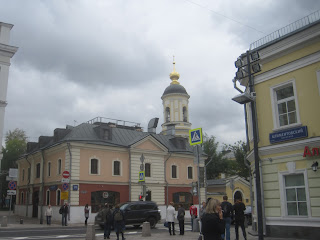 |
| Fancy old buildings in Zamosvkorechye, an old part of town. |
 |
| Fancy buildings turned sideways. |
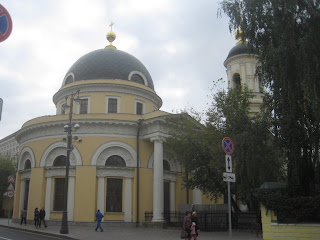 |
| A fancy, non-traditional church. |
 |
| Another fancy, more traditional church. |
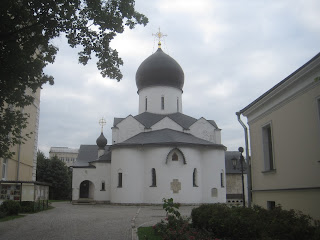 |
| As above--this neighbourhood is crawling with them. |
 |
| This one is also fancy. |
 |
| Long live the Soviet Union. |
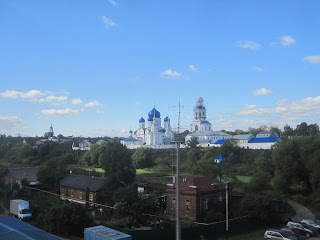 |
| This temple complex is, I think, in Vladimir. |
 |
| A famous church in Bogolyubovo. |
 |
| A view of the Russian landscape in Suzdal. |
 |
| A church in Suzdal. |
 |
| As above. This one has a famous belfry, I think. |
 |
| People selling stuff to the backdrop of another church. |
 |
| A lump of earth where the city's wooden fortifications once stood. |
 |
| A famous church. |
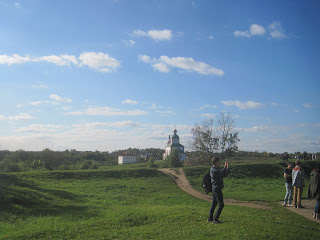 |
| A footpath, the sky, a tourist, and a church. |
 |
| Traditional houses in Suzdal. |
 |
| A famous, and massive, cathedral in Vladimir. |
 |
| As above, plus old buildings. |
 |
| A view of the countryside near Vladimir. |
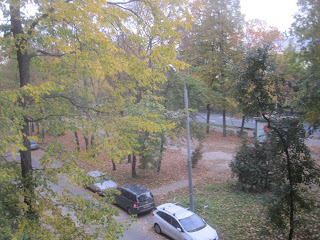 |
| A view of fall from my window. |
 |
| The bathroom was a work of art. |
 |
| There were lots of unexplained holes in the walls. |
 |
| Note the wooden structure by the toilet. |
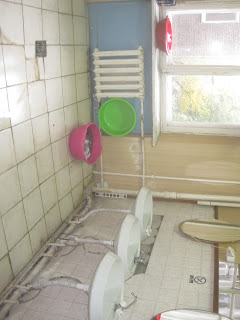 |
| Some of these sinks worked. |
 |
| Not sure why I included this--one gets used to it quickly. |
 |
| As above. I probably initially considered this dirty. |
 |
| One of our showers. They were short on tiles. |
 |
| The ceiling of one of the showers. |
 |
| Fall in full motion. |
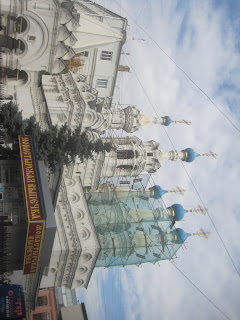 |
| A fancy church near the institute. |
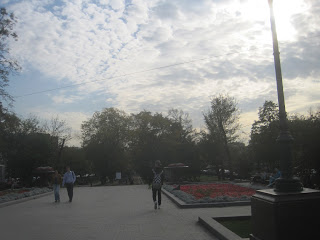 |
| Crazy clouds in the city centre. |
 |
| Festive stalls in preparation for New Year's, I think. |
 |
| The soft evening light (sideways, god damn it all). |
 |
| A market just outside of Moscow. |
 |
| Vegetables. |
 |
| First snow in Moscow. |
 |
| A depressing autumn day. |
 |
| More Soviet propaganda (in Nizhny Novgorod). |
 |
| A view of some giant river in Nizhny Novgorod. |
 |
| The other shore (churches, no other development). |
 |
| There were lots of statues like this one. |
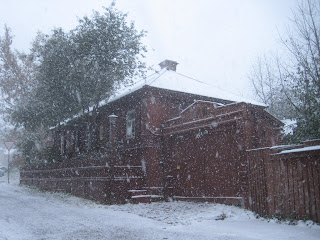 |
| Maxim Gorky's childhood house in a small-scale blizzard. |
 |
| One of the city's main streets. |
 |
| Part of the kremlin, a church, a statue, and a fancy building. |
 |
| A small section of the kremlin wall. |
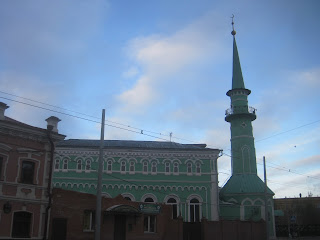 |
| A mosque in Kazan. |
 |
| Traditional Tartar houses. |
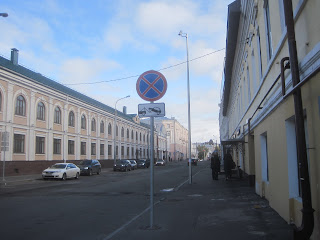 |
| Some fancy building or other. |
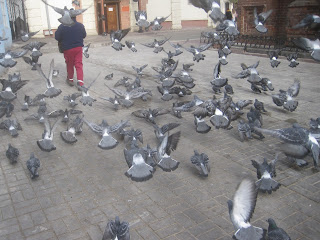 |
| Excited pigeons. |
 |
| A massive, very fancy church. |
 |
| Part of the wall around Donskoi Monastery (I think). |
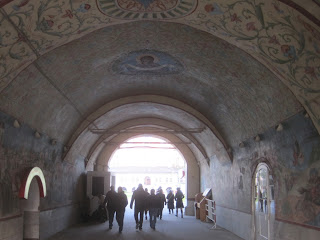 |
| An archway leading into it. |
 |
| A beautiful, and sideways, church. |
 |
| This plaque is in memory of something. |
 |
| Keep in mind that the Russians embalmed Lenin. |
 |
| Fall in full force again. |
 |
| Some bushes flash their colours. |
 |
| The intersection near where I studied. |
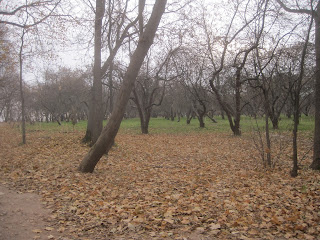 |
| I suppose that we do not have many deciduous trees back home. |
 |
| An ersatz reproduction of an imperial mansion. |
 |
| A traditional wooden home near the above. |
 |
| Soviet apartment blocks. |
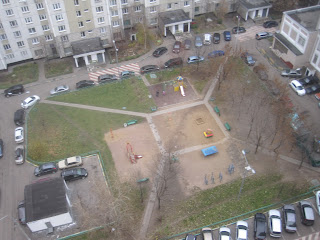 |
| A traditional Soviet courtyard. |
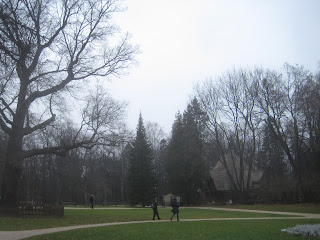 |
| Not sure how this got in here--I got mixed up. |
 |
| The river near a former artist colony near Moscow. |
 |
| Part of Red Square. |
 |
| The Kremlin from across a nearby bridge. |
 |
| Not sure why I included this. |
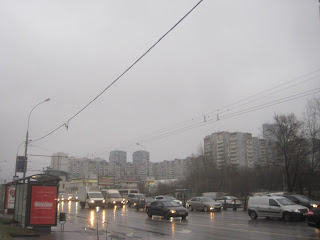 |
| A dispiriting late-autumn day. |
 |
| Light snowfall in the giant forest near where I lived. |
 |
| Crazy clouds in November or thereabouts. |
 |
| Very picturesque frost on some trees. |
 |
| The start of a bloodless sunset from my window. |
 |
| A fiery sunset. |
 |
| This unsuspecting challah was soon eaten. |
 |
An early sunset against the symbol of contemporary Russia:
MacDonald's. |
 |
| Gorgeous clouds on a clear day. |
 |
| I accidentally put my fur hat on backward. |
 |
| A gorgeous sky at sunset near the Kremlin. |
 |
| Fantastic evening light near where I lived. |
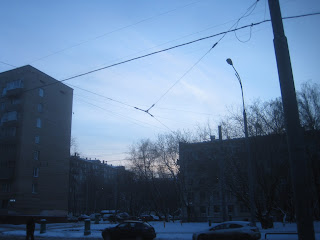 |
| Pale early winter light. |
























































































No comments:
Post a Comment